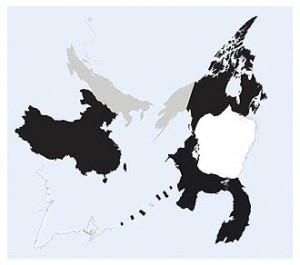
Dr. Dr. Dave Warner (PhD, MD)
Ref A: Cyber-Pass Meets Khyber Pass
Ref B: Warner to Clapper on PRT Comms
Ref C: UnityNet White Paper Final

See Also:
Earth Intelligence Network “One Call At a Time”

Dr. Dr. Dave Warner (PhD, MD)
Ref A: Cyber-Pass Meets Khyber Pass
Ref B: Warner to Clapper on PRT Comms
Ref C: UnityNet White Paper Final

See Also:
Earth Intelligence Network “One Call At a Time”
What an interesting search, thank you. Here are some links that came up in a broader search that we import to Phi Beta Iota with a tip of the hat to the anonymous searcher.
Cross-Domain Collaboration Takes Center Stage at NATO Network-Enabled Capability (NNEC) Conference (Intelligence and Knowledge Development, March 12, 2010)
IMPLEMENTATION OF NATO EBAO DOCTRINE AND ITS EFFECTS ON OPERATIONAL STAFFS’ STRUCTURE AND FUNCTIONS by Cristophe MIDAN Strategic Impact (Impact Strategic), issue: 4 / 2009, pages: 3954, on www.ceeol.com.
MCC Northwood Effects Based Approach to the Operational Planning Process, CDR J.L. Geiger, USN N521 (Bottom line: Knowledge Development is OSINT outside of the IC combined with rotten and thin secret intelligence from Member states).
Cody Burke, Freeing knowledge, telling secrets: Open source intelligence and development (Centre for East-West Cultural and Economic Studies, CEWCES Research Papers, Bond University, 2007)

Taming Twitter’s Streams With Automated Web Sites
Unlike Facebook, whose builders strive to make it an ever more organized social network, Twitter seems to thrive on being a jumble. It is an egalitarian sort of mess: Twitter does not sort its users into categories, does not tag some as celebrities, does not map out who does lunch with whom in the real world. You and Shaquille O’Neal are Twitter equals, only he has an extra 2.8 million followers.
There is also a Web site, Listorious listorious.com where volunteers publish personally chosen lists of posters to follow based on specific themes. But it is hit or miss. The Best of Photography list is a sharp collection of 29 eye-catching feeds, but Tech News People is a pile of 499 journalists for you to sort through.
So, how do you figure out who to follow? Start with a sweeping generalization: Twitter users can be grouped into different categories. For each, there is an automated site somewhere that lets you follow the genre without having to find and follow dozens, or even hundreds, of individual Twitter streams.
Phi Beta Iota: This article provides an extraordinary bridge to the future, when Twitter could become the real-time feed for inputs easily sorted in an infinite number of “back offices” that remix the information by threat, policy, player, and zip code. The difference between Google and Twitter is that Twitter empowers the end-user, Google ravages the end user (intellectually and metaphorically speaking).

Exhibition at Carnegie Mellon gives geography a new meaning
“Experimental Geography” is both the title of a mind-expanding exhibition and a term coined by contemporary artist/geographer/activist Trevor Paglen, who will speak tomorrow at Carnegie Mellon University.
If a geographer informs us about the land that we move within, or study from afar, an experimental geographer considers that land from the creative vantage point of an artist.
“In a manner that deploys aesthetics, ambiguity, poetry and a dash of empiricism,” the exhibition text explains.
“Mappa Mundi,” a digital print by New York artist Lize Mogel, is part of a series exploring public space and cultural geography.
 Phi Beta Iota: What all of these headlines have in common is the failure of Epoch A “leadership” or what Peggy Noonan has called the failure of institutions and Robert Steele called the paradigms of failure.
Phi Beta Iota: What all of these headlines have in common is the failure of Epoch A “leadership” or what Peggy Noonan has called the failure of institutions and Robert Steele called the paradigms of failure.
Top-down command & control is incapable of meshing with bottom-up complexity that demands clarity, diversity, integrity, and legitimacy in order to achieve adaptive sustainable resilience.
 SEC mulled national security status for AIG details
SEC mulled national security status for AIG details
On the trail of the Taliban in Quetta
Gates Strikes out In Pakistan; Obama's AfPak Policies in Disarray

Nokia Voice Nav Spells Doom For TomTom, Garmin
Jared Newman, PC World
Jan 21, 2010 4:18 pm
As Nokia takes on Google with turn-by-turn voice navigation on select smartphones, the worst nightmares of GPS device makers are coming true.
Nokia and Google are both using free GPS applications as a lure to their products. That means they're competing, which means those free applications will get better. As that happens, it'll be harder for TomTom, Garmin and Magellan to make their paid software or hardware seem attractive.
Already, Nokia claims to have one-upped Google in the crucial area of pre-loaded maps. While Google Maps Navigation requires a data connection, Ovi Maps uses a combination of pre-loaded and online maps, but can load directions even in a dead zone. When it does need to load information, Nokia says it's more efficient than Google's application, requiring only 200 KB of data over a 12-mile stretch of road compared with 2 MB for an Android phone.
Continue reading “Journal: GPS Finally Fully Integrated in Voice Comms”

Recurring Themes:
1) US Intelligence Community does not actually “know” where Iran is on nuclear, where Yemen is on Al Qaeda, where the Taliban is on Afghanistan….the list is long.
2) CIA and DoJ ares out of control on assessments and investigations–or they are consistently politicized. One or the other, which is it?
3) Terrorism is still the crutch for those unable or unwilling to comprehend Grand Strategy and a more mature appreciation for all of the threats, all of the policies, all of the information, all of the time. The USA remains government by uninformed sound-bite.
4) India matters, so we are told, as a recipient of expensive U.S. war-fighting technology and as a partner against terrorism. Never mind the deeply shared problem of poverty in America and India, a problem quickly addressable by the redirection of a fraction of the Pentagon budget toward “peaceful preventive measures.”
EDITORIAL: Panther politics (Washington Times)
Herewith, then, is an all-inclusive guide to the scandal of the New Black Panther Party voter-intimidation case, based largely on documents unearthed by The Washington Times, along with other original reporting – and why it is important:
FBI broke law for years in phone record searches (Washington Post)
The FBI illegally collected more than 2,000 U.S. telephone call records between 2002 and 2006 by invoking terrorism emergencies that did not exist or simply persuading phone companies to provide records, according to internal bureau memos and interviews. FBI officials issued approvals after the fact to justify their actions.
Terrorists will strike America again (Greg Treverton in Los Angeles Times)
The Christmas Day episode highlights three critical points. First is how much progress U.S. intelligence has made. . . . Second, the Christmas Day plot demonstrates that much of what passes for security is a waste of time and money. . . . Third, the public furor over the foiled plot shows that more perspective on terrorism is essential.
Review Says Iran Never Halted Nuke Work In 2003 (Washington Times)
Rep. Peter Hoekstra, Michigan Republican and ranking member of the House Permanent Select Committee on Intelligence, said in an interview that “they wrote a political document in 2007 to embarrass President Bush which everyone uniformly agrees was a piece of trash.”
The al Qaeda statement couldn't be independently verified.
NIGHTWATCH on Afghanistan (John McCreary)
NIGHTWATCH Afghanistan: Multiple news services reported today’s bold Afghan Taliban attacks in Kabul. The coordinated multiple attacks killed at least 15 and injured 62, as reported in this Watch
Four militants also were killed, including two suicide bombers who detonated their explosives, and Afghan forces were searching several other areas in the city for more attackers, a government spokesman said.
It was the biggest attack in the capital since 28 October when gunmen with automatic weapons and suicide vests stormed a guest house used by U.N. staff, killing at least 11 people including three U.N. staff.
The attack coincided with the investiture of those Cabinet members in the Karzai government who had been confirmed by the Parliament. A majority of his choices have been rejected twice.
Below the Fold Complete NIGHTWATCH on Afghanistan